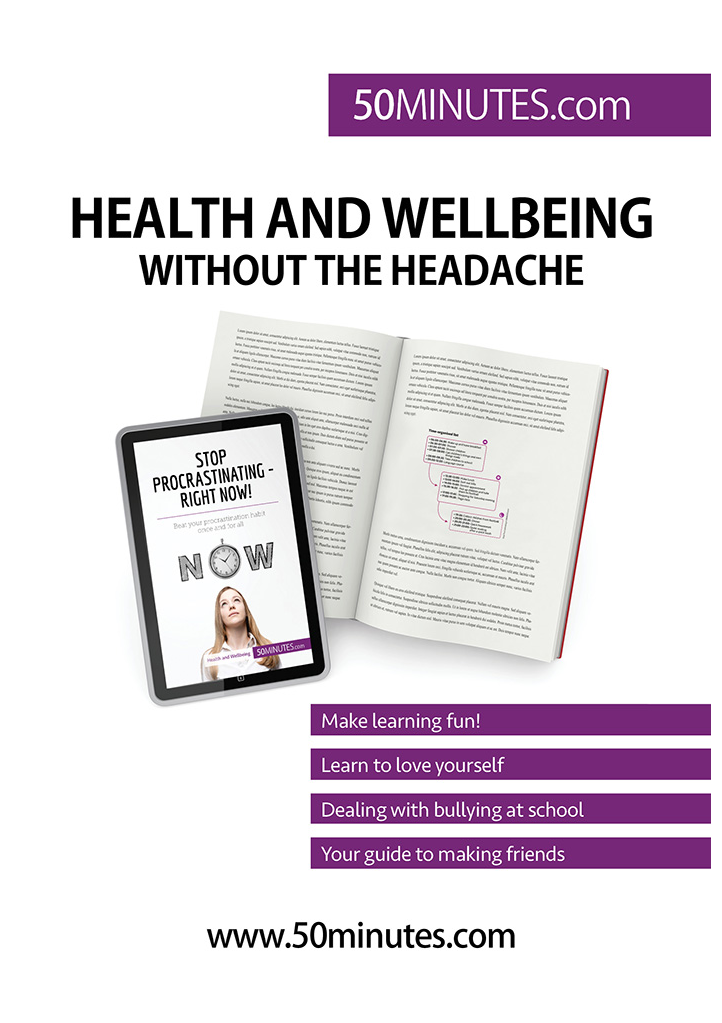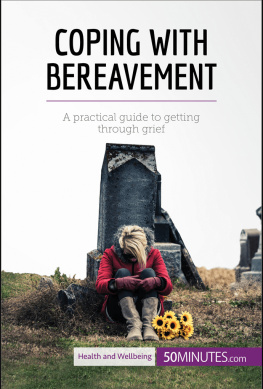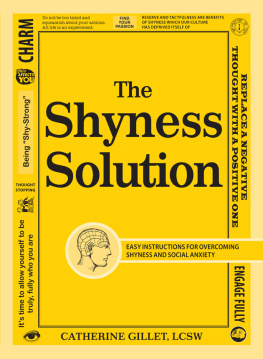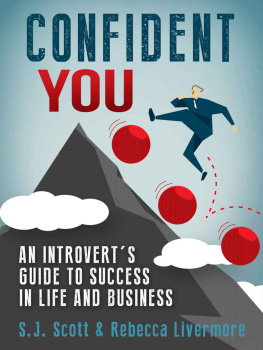50Minutes.com - Simple Solutions to Shyness: Easy tips to become more confident and outgoing
Here you can read online 50Minutes.com - Simple Solutions to Shyness: Easy tips to become more confident and outgoing full text of the book (entire story) in english for free. Download pdf and epub, get meaning, cover and reviews about this ebook. City: Cork, year: 2017, publisher: Primento Digital;50Minutes.com, genre: Religion. Description of the work, (preface) as well as reviews are available. Best literature library LitArk.com created for fans of good reading and offers a wide selection of genres:
Romance novel
Science fiction
Adventure
Detective
Science
History
Home and family
Prose
Art
Politics
Computer
Non-fiction
Religion
Business
Children
Humor
Choose a favorite category and find really read worthwhile books. Enjoy immersion in the world of imagination, feel the emotions of the characters or learn something new for yourself, make an fascinating discovery.
- Book:Simple Solutions to Shyness: Easy tips to become more confident and outgoing
- Author:
- Publisher:Primento Digital;50Minutes.com
- Genre:
- Year:2017
- City:Cork
- Rating:4 / 5
- Favourites:Add to favourites
- Your mark:
- 80
- 1
- 2
- 3
- 4
- 5
Simple Solutions to Shyness: Easy tips to become more confident and outgoing: summary, description and annotation
We offer to read an annotation, description, summary or preface (depends on what the author of the book "Simple Solutions to Shyness: Easy tips to become more confident and outgoing" wrote himself). If you haven't found the necessary information about the book — write in the comments, we will try to find it.
Simple Solutions to Shyness: Easy tips to become more confident and outgoing — read online for free the complete book (whole text) full work
Below is the text of the book, divided by pages. System saving the place of the last page read, allows you to conveniently read the book "Simple Solutions to Shyness: Easy tips to become more confident and outgoing" online for free, without having to search again every time where you left off. Put a bookmark, and you can go to the page where you finished reading at any time.
Font size:
Interval:
Bookmark:



- Problem: many people struggle with public speaking, or find themselves stammering or blushing when they try and express their opinion in a conversation. Shyness is often seen as a minor, inconsequential flaw with no impact on the daily lives of those who experience it. However, it can soon become debilitating in interpersonal relationships.
- Aims: to learn where your shyness comes from and get it under control.
- FAQs:
- I have been shy since I was a child. Should I just accept it and learn to live with it?
- Acting is often recommended as a way of combatting shyness. Does it actually work?
- Are all shy people introverts?
- Can shyness be an advantage in the world of work?
- I avoid all social activity because meeting new people and talking in public terrifies me. Am I just shy, or is it something more serious?
Im incredibly shy. Whenever Im in a group with people I dont know very well, I stay in the background and pray that nobody asks me a question or starts a conversation with me. When that happens and I feel that everyones eyes are on me, I look at my feet, go red and quickly mumble a short answer, hoping that that will be the end of it. (Jennifer, 30)
Although it is far from a serious illness, in modern society and especially in the world of work, shyness is often seen as a terrible flaw that can hold back those who suffer from it. Indeed, the model employee is expected to be outgoing, enjoy teamwork, take initiative and be able to assert themselves and express their opinion. The same goes for our personal lives, where evenings with friends often turn into a chance to meet new people. However, social skills do not come naturally to everyone. Some people break out in a cold sweat, tremble, experience palpitations and face a whole host of other unpleasant symptoms at the very thought of taking part in a conversation. Shy people find themselves paralysed in social situations and pushed into the background on a daily basis. They are plagued by doubts that they cannot shake off, and feel that they are being judged harshly every time they express an opinion or put forward an idea. While shyness can be debilitating in everyday life, a much more serious form of pathological shyness known as social anxiety disorder or social phobia may take hold if it is not dealt with, on both an individual and a professional level. But where does shyness come from? And why does it only affect some of us? Some people are constantly brimming with confidence and everything always seems to go their way what is their secret? What can we do to, if not conquer shyness, at least get our social anxiety under control so that it no longer rules our lives and our relationships with other people?
In 50 minutes, you will find out the secrets of your shyness: where it comes from, why it is so severe and, above all, how you can overcome it, with the help of targeted advice and practical tools to use on a daily basis.
Nothing in life is to be feared, it is only to be understood. (Marie Curie, scientist and two-time winner of the Nobel Prize)
While the Collins English Dictionary defines a shy person as someone who is nervous and uncomfortable in the company of other people, the French psychiatrist Christophe Andr gives a much more precise definition. According to him, this psychological mechanism manifests itself in an individual when they are faced with anxiety-inducing social situations. Although the shy person has a clear desire to build relationships and interact with those around them, they become withdrawn and avoidant in order to escape the embarrassment and discomfort they experience.
Shyness is a universal problem which can affect anyone, regardless of their gender, nationality or social status. Some great personalities were reportedly extremely shy, sometimes to an unhealthy extent. According to a study carried out by the American psychologist Philip Zimbardo at Stanford University, almost one person in two admits to feeling shy on a daily basis. These results have been confirmed by other studies carried out across the world.
Did you know?
The French actor Jacques Villeret (1951-2005) was extremely shy, but this did not stop him from having a successful film career. He once claimed that he did not trust people who were not shy, as he saw this as abnormal (Durieux, 2008).
Shyness can occur at any age, and is part of the normal development of every individual. For example, in the 1960s the American psychoanalyst Ren Spitz drew attention to a particular phenomenon, which he called eight-month anxiety and which manifests itself in the infant as a fear of strangers and a refusal to leave the arms of its attachment figure, usually the mother. Most children between the ages of two and three also go through a phase of shyness around strangers, which may be longer or shorter depending on their personality. Adolescents are also not immune to shyness: according to a study carried out on a sample of some 10 000 American teenagers between the ages of 13 and 18, around 50% of young people describe themselves as shy, and almost 12% display signs of social phobia (Burstein, Ameli-Grillon and Merikangas, 2011). This fear of the unfamiliar generally disappears in adulthood, although this is not always the case. It is also worth pointing out that adults who never suffered from shyness as children can by affected by social anxiety.
When I was a child, I used to talk to everyone and I wasnt afraid of interacting with strangers. That all changed when I reached adolescence. Some of my classmates started to reject me and make fun of me, for no good reason, just because they didnt like the way I dressed or talked. I must have been 13. That was when I started to withdraw into myself. (Sarah, 25)
It is easier to recognise shyness by the symptoms which characterise it than by the situations which trigger it. However, a distinctive feature of shyness is that it is always linked to social situations; indeed, shyness only exists in relation to other people. Although this makes it difficult to draw up a concrete list of anxiety-inducing situations which cause significant stress and encourage a person to become shy, it is nonetheless possible to outline general social circumstances which trigger the feeling of discomfort and unease that shy people suffer from. In most cases, this embarrassment manifests itself when we become the centre of attention and all eyes are on us, because we feel that there is nowhere to hide and judgement, whether it is positive or negative, is now inevitable. Stepping into the spotlight is a significant source of anxiety for shy people. Frequent and unavoidable anxiety-inducing situations include:
- giving a presentation in front of a group of people (class, work colleagues, an audience, etc.);
- sitting an oral exam or being interviewed for a job;
- talking to someone we find attractive;
- having a discussion with someone we admire;
- meeting new people.
The five types of shyness
Font size:
Interval:
Bookmark:
Similar books «Simple Solutions to Shyness: Easy tips to become more confident and outgoing»
Look at similar books to Simple Solutions to Shyness: Easy tips to become more confident and outgoing. We have selected literature similar in name and meaning in the hope of providing readers with more options to find new, interesting, not yet read works.
Discussion, reviews of the book Simple Solutions to Shyness: Easy tips to become more confident and outgoing and just readers' own opinions. Leave your comments, write what you think about the work, its meaning or the main characters. Specify what exactly you liked and what you didn't like, and why you think so.














